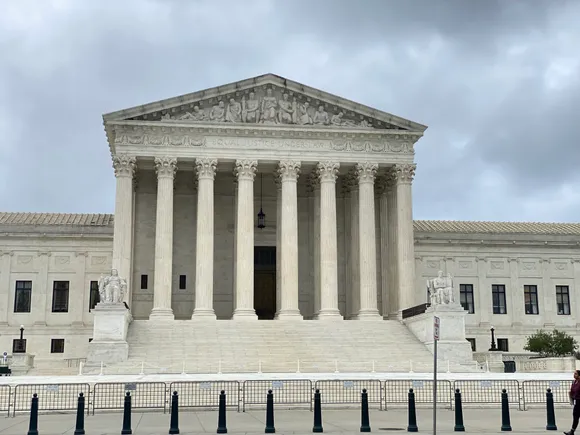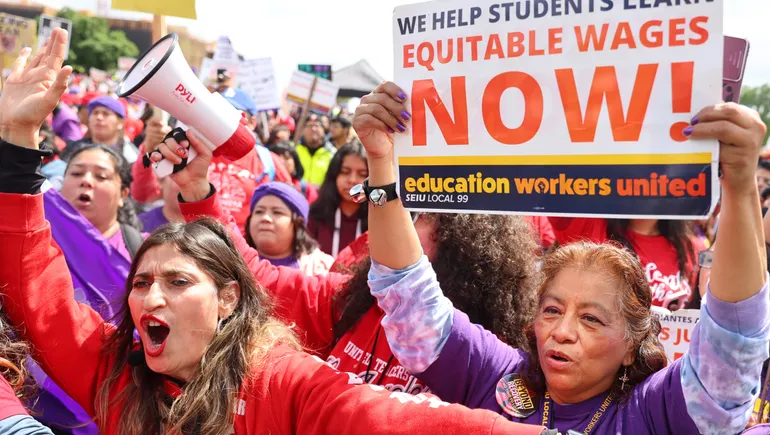Multiple U.S. Supreme Court justices challenged a Florida city government’s position on Monday that a retired firefighter could not sue under the Americans with Disabilities Act over alleged disability discrimination with respect to a retirement healthcare benefit that she earned while working for the city.
During oral arguments in Stanley v. City of Sanford, Jessica Conner, counsel for Sanford, Florida, said that the 11th U.S. Circuit Court of Appeals’ decision that the firefighter could not sue “should not be controversial,” because the plaintiff could no longer perform the essential functions of her job with or without a reasonable accommodation.
“Everyone agrees, for example, that an employer does not violate Title I [of the ADA] when it fires an employee who can no longer perform the essential functions of their job,” Conner said. “The outcome should be no different here simply because retirees or post-employment benefits are involved.”
Justice Sonia Sotomayor said she was not sure that a retired employee such as the plaintiff would no longer be qualified under the ADA. Justice Samuel Alito noted that the plaintiff, who retired due to complications of Parkinson’s disease, could have claimed to be aggrieved by the company’s benefits policy in the months before she retired due to her condition.
“Does she not have Article III standing because there’s an imminent threat of what she claims is unlawful conduct in the future?” Alito asked.
Conner said that the plaintiff would not have standing. She compared Alito’s example to that of an employee with a disability who sues to enjoin an employer from terminating employment “when, of course, under Title I, employers are allowed to terminate employees the moment they become unqualified and they can’t do the job with or without a reasonable accommodation.”
However, Conner argued that other kinds of ADA claims could show that an employee was discriminated against with respect to post-employment benefits. For example, a benefits policy that specifies an employer will not pay a pension to employees who develop disabilities could be challenged.
“The difference is our policy is not [that] no disabled person gets a pension,” Conner said. “It’s a policy that applies only to people who become unable to do the job because they’re totally disabled.”
Who is a ‘qualified individual’?
Stanley centers on the question of whether an employee who is no longer a “qualified individual” under the ADA — defined as a person who, with or without reasonable accommodation, can perform the essential functions of the position that such a person holds or desires — may sue with respect to post-employment benefits earned during the course of their employment.
Specifically, the plaintiff in Stanley received as part of her employment a retirement health insurance fringe benefit that would cover insurance costs for qualifying retirees until age 65. But four years into the plaintiff’s tenure, the city changed this plan to specify that enrollees who retired early due to disability would only receive the benefit until they received Medicare benefits or until 24 months had elapsed since the date of their retirement, whichever came first.
The plaintiff retired early in 2018 due to complications associated with a Parkinson’s disease diagnosis. Unaware of the plan changes made by the city, however, she received the insurance subsidy for 24 months before it was discontinued. She sued the city alleging that the policy discriminated against her on the basis of her disability, but the 11th Circuit held that she lacked standing because she was not a qualified individual at the time of the alleged discrimination.
The high court could determine that the plaintiff was so qualified simply by recognizing that employees may sue when they allege that they were discriminated against while still employed, said Deepak Gupta, counsel for the firefighter in Stanley. For example, Gupta said that his client was employed as a firefighter between the time of her Parkinson’s diagnosis and the time of her retirement, meaning that she was subject to the allegedly discriminatory policy during that period.
“If the Court adopts this rationale, it should make clear that it is not foreclosing the possibility that an employee may also challenge discrimination that, unlike here, occurs entirely after their last day on the job,” Gupta continued.
Separately, the court also could decide Stanley using a broader rationale, which is that the ADA’s qualified individual requirement does not impose a temporal limitation on the law’s protections.
Sotomayor questioned the implications of a situation in which a retiree sues his former employer for retirement benefits that were not promised to the retiree at the time of his employment, but that are given to subsequent retirees of the same company. She asked Gupta whether the plaintiff’s reading of the ADA would permit such a person to sue. Gupta said that he believed such a suit would fail.
“I understand the intuition of the question, which is: Have we opened some big trap door that expands the reach of the statute in a way that we should be worried about?” Gupta said. “And I think one way to answer the question is to look at the discrimination rule and notice that it still requires that any claim be in regard to employee compensation or the terms, privileges, or conditions of employment.”
Similar court precedent exists for discrimination under Title VII of the 1964 Civil Rights Act, Gupta noted, “and we’re not concerned in the Title VII context that there is some trap door that only opens up a large category of claims,” he said. “And the reason why is you don’t have a claim of that kind unless there is either a prospective employment relationship or some employment relationship that is the locus of that discrimination.”
Gupta also argued that the 2009 Lilly Ledbetter Fair Pay Act, which amended the timeframe by which an employee may bring challenges to a discriminatory compensation practice under laws such as the ADA, also supports the plaintiff’s position.
Specifically, Gupta said the Fair Pay Act clarified that an unlawful practice “occurs at three points: the adoption, when the person is subject to the policy, and then where the effects are felt.” Therefore, a retiree subjected to a discriminatory policy could sue at the time that such a policy applies to them.
How might courts apply the firefighter’s argument?
Alito questioned how courts would apply the petitioner’s position, especially in the context of the ADA’s reasonable accommodation clause. Alito said he was “hard-pressed” to see how the clause applied to retirement benefits and asked whether the alleged discrimination instead involved the disparate treatment between employees who retired due to disability and those who worked long enough to receive the city’s healthcare retirement benefit.
“How is a court supposed to determine whether this distinction between somebody who works 25 years and somebody who works a shorter period and retires based on disability is unlawful?” Alito said. “What is the test for determining that?”
Gupta said that a plaintiff with a disability would need to show that an employer treated them differently because of their disability. In other words, if the firefighter in Stanley was not disabled and had worked the required number of years of service to become eligible for the benefit, she could show that she would have received the benefit had she not been singled out for having a disability.
Alito asked the same question of Frederick Liu, the assistant to the solicitor general who appeared at the arguments on behalf of the U.S. in support of the plaintiff in Stanley. Liu said that courts would have to ask how a similarly situated person without disabilities would be treated, but that the question would not have any bearing on the questions presented in Stanley.






Leave a Reply